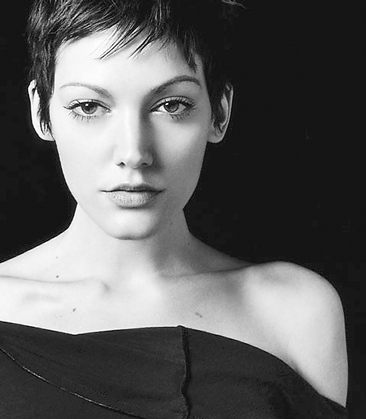Young pop star strikes out in new directions in her debut solo album
“I never wanted to be a face or a product,” she explained in a recent interview. “I had no idea that is what I had signed up to be. I had spent my whole life doing what I was told. I was 20 with no idea of who I was… only an impulse of what I wasn’t. When I realized that I was about to be another manufactured pop tart, I shaved my head, started screaming in black instead of bouncing in pink.”
But her hair isn’t completely butched, her voice remains quite pretty when she screams, and she makes black look natural. Likewise, while her music definitely rejects overt pop, it remains catchy and focused, sounding somewhat like Garbage meets a female Trent Reznor. Her biographical info lists her influences as Annie Lennox, Joan Jett, and Gwen Stefani––pop, to be sure, but remember, Stefani was a founder of female pop punk rebels.
The album, composed spontaneously over a two-week writing spree in New York and London, offers a hybrid of melodic electronic, dance, pop, and rock. At times, “Random Order’ conveys nostalgia for 1980s post-punk while a few songs settle into a ‘90s grunge track. Other songs seek new musical ground through the reinvention of old themes and styles.
The second track, “Avalon,” runs nearly eight minutes with a great groove, nice woody bass, and sweet vocals––great for a saucy slow dance or for slightly sexy background music. An eerie piano and orchestra fade out over a heartbeat dance thump until the song closes on a lonely, ambivalent piano tone. The album moves swiftly into the crackling mechanic power of “Nu Taboo,” with its catchy chorus and ricochet-like sound effects.
The album’s single, “Ride the Pain,” is already available in a number of varied remixes, great for everything from raves to living rooms. It’s liable to make it on the airwaves any day, although it is the weakest song on the album.
“Never Land” is 100 percent Nine Inch Nails with its demonic, bubbling bass and militant stomp. This is where her voice takes on a Reznor-like blend with windy techno sounds and undulating rhythms. The dark hardness continues with “Puppet,” which achieves a jagged, almost completely technology-produced sound with a few hard metal guitar crunches and tough love lyrics ––“I think you would have tried to stop me if you’d ever had me… Work you like a puppet, love you like velvet.”
“Waiting” offers the albums most moving lyrics ––“why do you hesitate, hearts like mine don’t break”––and its slowest pace. Juliet’s voice winds down to sweet, lulling softness and breaks only for a twilight smooth guitar interlude. The song is tender without being sappy. The only downfall is ocean waves closing the song. They wash into “New Shoes,” that begins with a Hindi-sounding melody that moves into an intriguing song reminiscent of Björk. Juliet demonstrates the rare ability to raise her voice to the top of her capacity and grind out a sharp, gutsy edge.
The album ends on a happy note and an up-tempo, easy beat. Juliet sings, “everything is going to be okay,” as if assuring herself that she is secure in her newfound style. Or maybe she’s just proud she’s doing the right thing.
“There’s enough fiction in the world. People become more interesting when they’re honest,” she stated in the CD’s biographical material. With a style like Juliet’s, and a debut album full of rebellious musical diversity, this woman gives us all some moments of honesty, at least while listening in.
gaycitynews.com




































